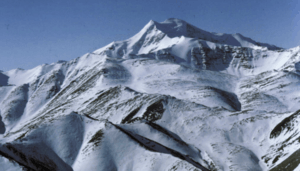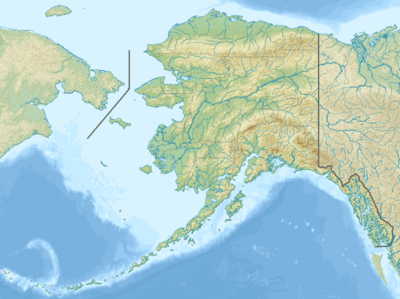Mount Chamberlin (Alaska)
Mount Chamberlin is the third highest peak in the Brooks Range, Alaska, USA.[5] Located in what are known as the Franklin Mountains of the Brooks Range, Mount Chamberlin is 30 miles (48 km) west-northwest of Mount Isto, the tallest peak in the Brooks Range. Mount Chamberlin is within the Arctic National Wildlife Refuge and was named for Thomas Chrowder Chamberlin (1843-1928), geologist of the Peary Auxiliary Expedition of 1894.[3][6] Previously believed to be the highest peak in the Brooks Range, in 2014 new measurement technology established that Mount Chamberlin is the third highest peak in the range.[7][8][1]
| Mount Chamberlin | |
|---|---|
 | |
| Highest point | |
| Elevation | 8,901[1] ft (2,713 m) [2] |
| Prominence | 4,101 ft (1,250 m) [2] |
| Listing |
|
| Coordinates | 69°16′38″N 144°54′32″W [3] |
| Geography | |
 Mount Chamberlin | |
| Parent range | Brooks Range |
| Topo map | USGS Mount Michelson B-2 |
| Climbing | |
| First ascent | 1963 by George G. Barnes, Dennis Burge, Graham Stephenson[4] |
| Easiest route | West Ridge: glacier/snow climb, Alaska Grade 1;[4] class 2 hike if route is ice-free |
References
- Nolan, M.; DesLauriers, K. (23 June 2016). "Which are the highest peaks in the US Arctic? Fodar settles the debate". The Cryosphere. 10 (3): 1245–1257. doi:10.5194/tc-10-1245-2016. Retrieved 23 June 2016.
- "Mount Chamberlin, Alaska". Peakbagger.com. Retrieved December 20, 2015.
- "Mount Chamberlin". Geographic Names Information System. United States Geological Survey. Retrieved December 20, 2015.
- Wood, Michael; Coombs, Colby (2001). Alaska: a climbing guide. Seattle, WA, USA: The Mountaineers. ISBN 0-89886-724-X.
- "Brooks Range". Peakbagger.com. Retrieved December 20, 2015.
- Mount Chamberlin, Alaska (Map). TopoQwest (United States Geological Survey Maps). Retrieved December 20, 2015.
- Howard, Brian Clark (December 16, 2015). "There's a New Tallest Peak in the North American Arctic". National Geographic. Retrieved December 20, 2015.
- Rozell, Ned (December 16, 2015). "Measuring the highest peaks in the Brooks Range". University of Alaska, Fairbanks Geophysical Institute. Retrieved December 20, 2015.
This article is issued from Wikipedia. The text is licensed under Creative Commons - Attribution - Sharealike. Additional terms may apply for the media files.